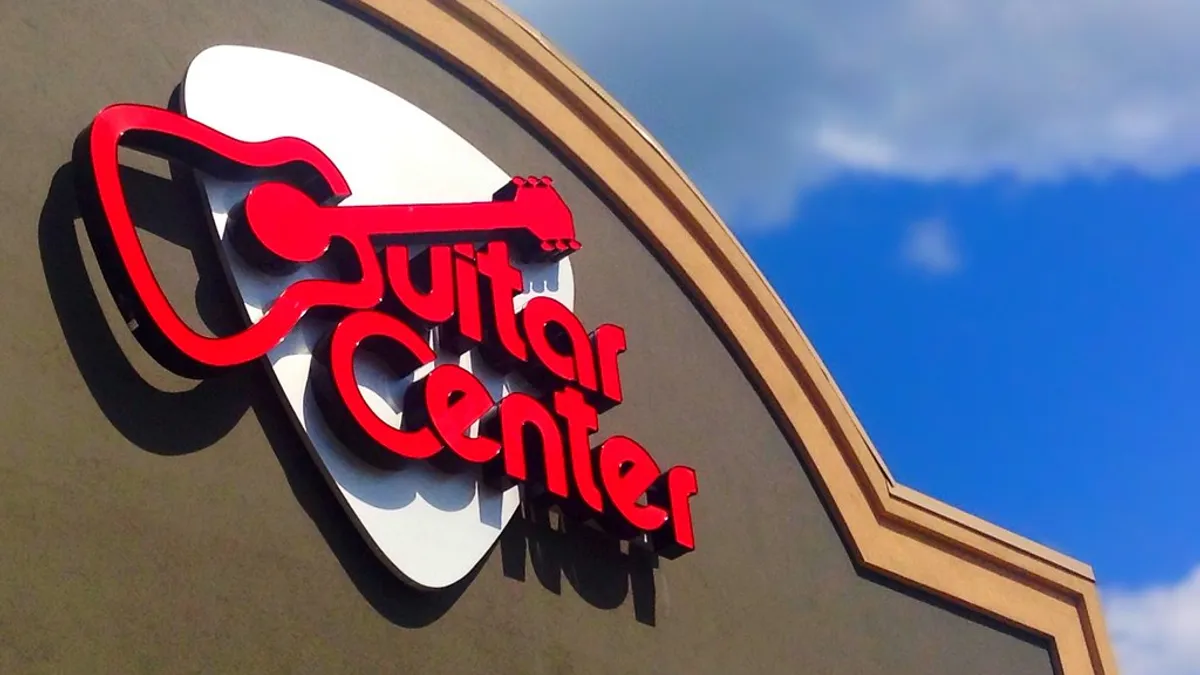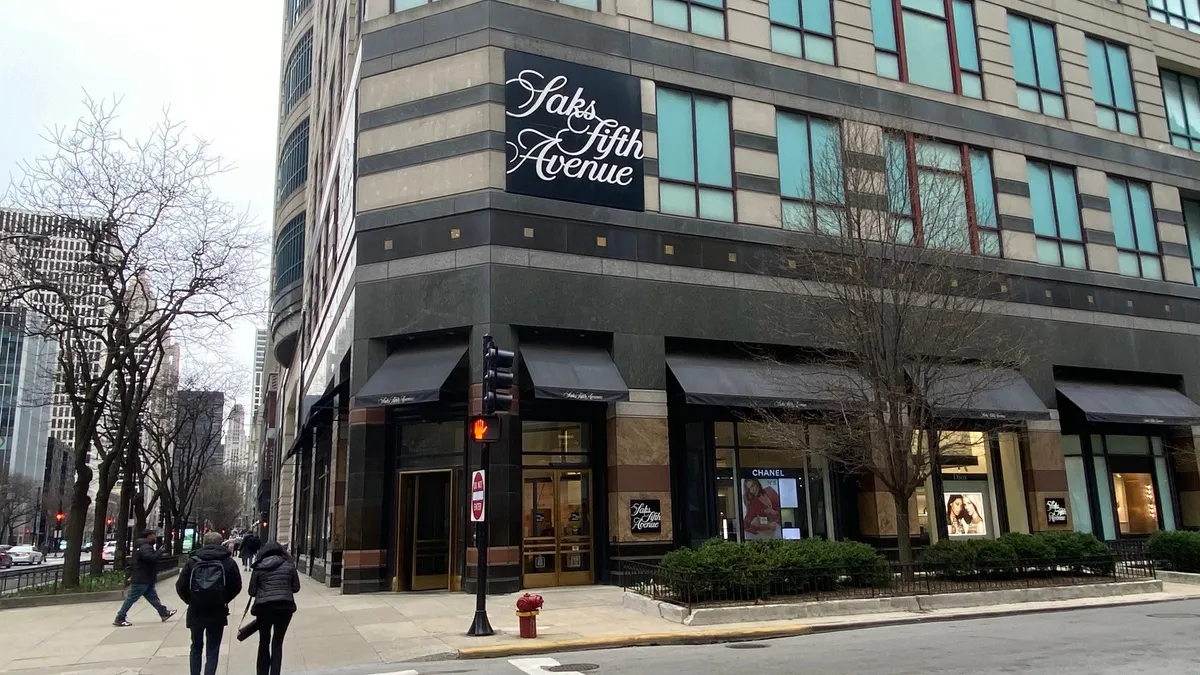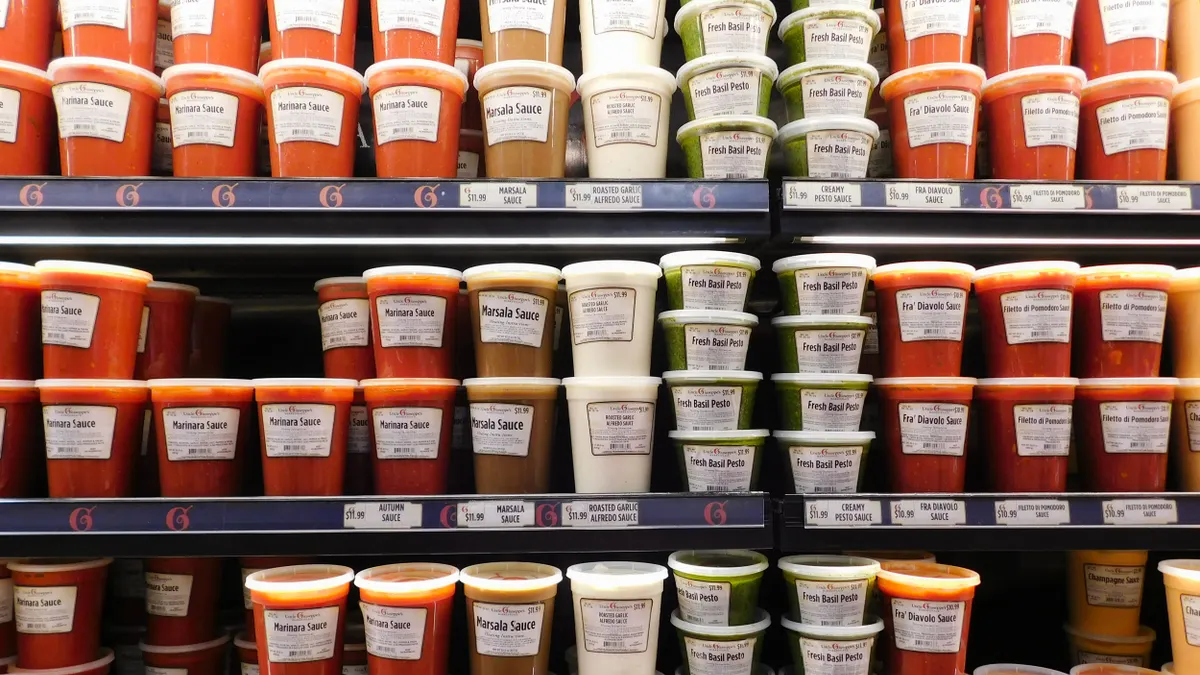Guitar Center and Sweetwater, two of America’s major music gear retailers, are striking slightly different chords with how they plan to maintain and grow their market share, customer loyalty and engagement in a specialty industry that includes newbies, hobbyists, influencers and full-time professionals.
Guitar Center operated 303 locations as of early November. The California-based company also operates about 250 stores under the Music & Arts banner. Those stores focus on school band and orchestra product sales and services.
Sweetwater, in contrast, is almost exclusively an e-commerce business, operating just one flagship physical store at its corporate headquarters in Indiana with no current plans to expand its brick and mortar presence.
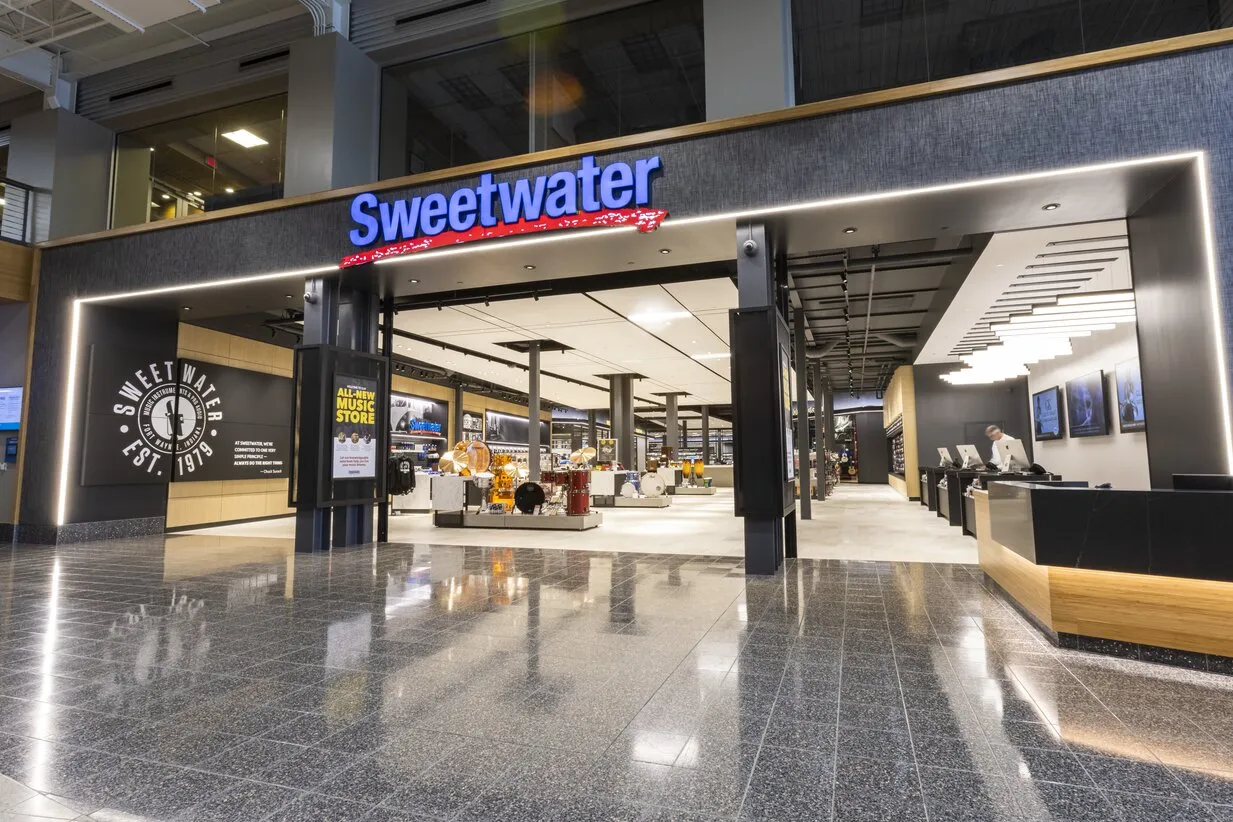
“Generally and generationally, I think there's just a momentum towards online shopping,” Sweetwater CEO Mike Clem said in an interview with Retail Dive. “Every category is seeing this increase in digital penetration.” Clem also said the pandemic reshaped expectations around online shopping.
With no other option during the height of the pandemic, many people decided to give online shopping a try. Clem said Sweetwater gained 2.5 million new customers during the pandemic and customer retention has remained strong.
Neil Saunders, managing director of GlobalData, said it is somewhat surprising that consumers seem increasingly comfortable making online purchases for musical gear because it’s often a deeply personal discretionary buy for a hands-on product.
“However, a distinction needs to be drawn between generalist purchases for those dabbling in music and more specialist purchases for those more involved in making music,” Saunders said in emailed comments to Retail Dive. “The latter will often have tested instruments at specialist retailers or during the course of their work, so they do try things out before buying. The former are quite content using Amazon or a non-specialist and making decisions by reading reviews and watching things like online videos.”
The May bankruptcy and closure of Sam Ash Music also means there’s one fewer major player in music retail’s brick and mortar sector. As the New York-based music retailer celebrated 100 years in business, it closed its 42 stores. Among other issues, the company said in court documents that it was too dependent on in-store traffic.
However, the Sam Ash brand name will continue on. Gonher Music, a Mexican-based company, won a bankruptcy auction to buy most of the company’s assets, including its e-commerce operation for $15.2 million. But a representative told Retail Dive that it has no plans to reopen physical stores and that its strategy will be focused on e-commerce.
“It's a sad story,” Clem said regarding Sam Ash’s closure. “We knew the Ash family well. Sam Ash was one of the most respected and iconic names in our industry. And even personally, you know, as a young musician, as a kid, I remember going into those stores and falling in love.”
News of Sam Ash’s closure drew an outpouring of lament online from customers and current and former employees. For musicians, all music stores, with their gleaming rows of instruments, impromptu jam sessions, music lessons and a regular clientele of local and renowned performers are more than just a place of business. They’re often a third place where people come to connect, learn and celebrate.
In early November, the company announced the opening of Sam Ash Direct, which it described as an "online music and sound megastore." In a message to customers, the company said it would offer "a seamless online shopping experience" featuring gear from top brands. The company also touted the debut of "gear experts" who are available to provide personalized guidance for purchasing decisions via phone or live chat.
Sam Ash’s loss could be Guitar Center’s gain, as the company confirmed it’s considering expanding the national footprint of its physical stores, CEO Gabe Dalporto told Retail Dive in a statement. “We do see opportunity to expand, and we’ve currently got a couple in the pipeline for the next year. However, the order of operations for us is to build and create a powerful customer experience in our existing fleet before we make significant expansions.”
However, pushing to grow its physical store presence might not be the best or only approach to position Guitar Center top industry and top of mind for consumers, according to Clayton Durant, founder of CAD Management and an adjunct professor of music business at Long Island University’s Roc Nation School of Music, Sports & Entertainment.
“Instead, the focus should be on enhancing their current retail presence to create a best-in-class, in-person customer experience for their core customer which according to their CEO, Gabe Dalporto, is the ‘serious musician,’ someone for whom music is a key part of their identity,” Durant said.
The company can do that, Durant said, by focusing on three areas. Guitar Center should leverage emerging technologies to elevate the shopping and equipment testing experience, invest in developing and training in-store staff, and reimagine store layouts to enable customers to discover and experience products “in the most engaging way possible to create a meaningful connection between the customer and the equipment or instrument they are considering purchasing.”
Durant said those initiatives are already taking shape under Dalporto’s leadership. He cited Guitar Center’s recent additions to the leadership team, including the hiring of Adolfo Rodriguez as chief technology and information officer. And Michael Martin joined the company as executive vice president of retail sales and operations.
“It is clear [Dalpoto] is gearing his leadership team up to mirror strategies from successful retail leaders like Walmart, which have excelled in integrating technology, customer service, and product experience to create a cohesive one of a kind retail environment,” Durant said.
But buying from Guitar Center offers two things that retail giants like Walmart or Amazon don’t.
“The first is ‘Sometimes I just want to go to Disneyland.” By this, they mean Guitar Center is ‘Disneyland for musicians.’ They want to come in and have a blast trying and playing cool new instruments. It’s like Space Mountain, but better,” Dalporto said.
“The second thing they say is ‘this is a big investment and I want to talk with someone who knows their stuff before I buy.’ So, we must have deeply trained product experts to help them make the right choice,” Dalporto said. “If we do those two things, we don’t need to worry about Amazon, because they don’t deliver these things.”
‘Mimicking that brick and mortar experience’
Although Sweetwater is primarily an e-commerce operation, the company goes the extra mile to offer great customer service and curated, personalized shopping experiences online, Clem said. For example, guitars over $299 get taken out of the box to receive a complete functional and cosmetic inspection. Each guitar is also captured with high resolution photos.
That means as a customer is shopping online, they can choose not just a specific make and model of guitar but an exact serial number if a detail like the wood grain pattern of the instrument catches their eye. Sweetwater customers are also paired with one the company’s 600 sales consultants, who maintain an ongoing relationship with them throughout their journey with the company.
“So in a lot of ways, what we're doing is mimicking that brick and mortar experience where I feel like I got up close and personal with this instrument, and I have the confidence in the comfort of buying,” Clem said. “And quite frankly, you're going to receive a better quality instrument, factory fresh, where you know so many of those guitars in local stores have been played.”
At the same time, Clem said they recognize the value and joy of making an emotional, tangible connection with a product. “I think there’s opportunity in the future for brick and mortar to be very relevant, but I think it has to transform to some degree into these more experiential reasons that connect to other reasons to be in the store,” Clem said.
In previous years, Sweetwater did that through events like Gearfest at the company headquarters campus. The annual event typically drew nearly 20,000 people. The pandemic ended the in person event but it continued as a virtual expo. Although the previous iteration of GearFest didn’t return, Sweetwater is producing smaller events targeted at segments of the music community. This summer, the company hosted DrumFest, which Clem said drew about 2,000 people. It also hosted its inaugural GuitarFest this year. Both events featured performances, product deals, merchandise giveaways and opportunities to engage with brand representatives.
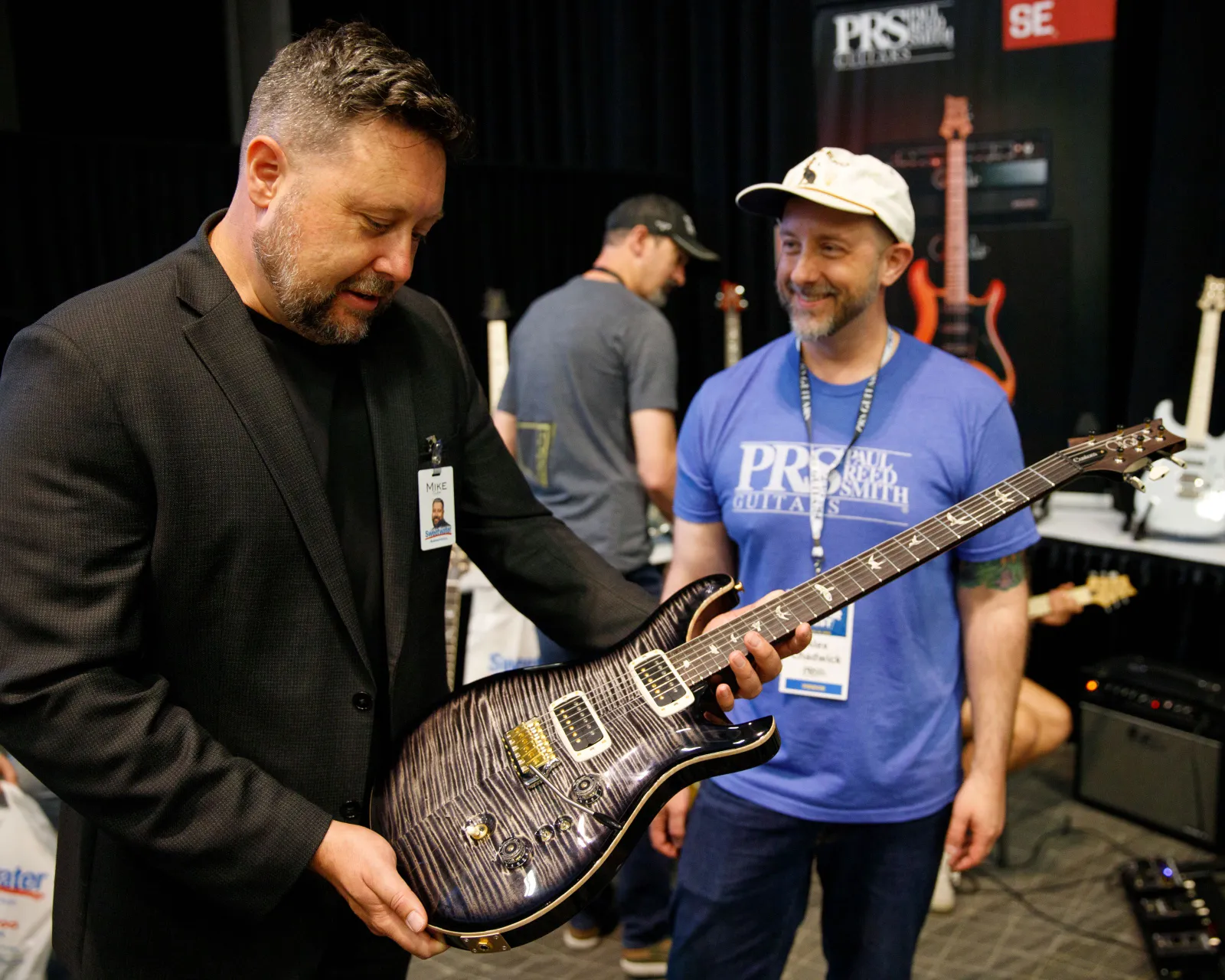
Guitar Center is also pushing further into the experiential retail space. In September, the company opened a state of the art studio in its flagship Hollywood, California, store. The company said its GC Pro Dolby Atmos Creation Studio is designed to showcase Dolby’s latest surround sound technology to artists, producers and content creators. The facility will also serve as a production studio for Guitar Center’s podcasts and artists interviews.
“This studio offers artists and engineers a space to experiment with groundbreaking technology, pushing the boundaries of creativity, and delivering next-level experiences to audiences worldwide,” Patrick Cloud, regional sales manager at Guitar Center Professional, said in a statement provided to Retail Dive.
A billion dollar business
Guitar Center and Sweetwater are typically top of mind for professional or hobbyist musicians. However, Amazon and Walmart, through their primary sites and marketplaces, are siphoning off some customers through their offering of musical instruments and related accessories, like cords, guitar strings and stands, industry observers said.
Although individual pieces of high end music gear can cost thousands — or even tens of thousands — of dollars in the big picture, music retail is “a relatively low penetration, low frequency sector,” Saunders said. “Not all consumers buy music products and those that do, don’t buy them very often. On top of this, the selection of products is vast and the volumes on individual SKUs is low. This makes it very difficult to balance the economics of running specialist chain stores in the sector.”
Saunders said GlobalData’s figures indicate that the sale of music-related consumer products was about $9.3 billion in 2023. By comparison, home goods was $1.1 trillion, apparel was $564 billion and electronics was $375.8 billion.
That’s not to say that music retail doesn’t move the needle when it comes to sales. Sweetwater is a billion dollar business, having first reached that sales threshold during the height of the pandemic in 2020. In early 2021, then-CEO and founder Chuck Surack told Rolling Stone the company was selling 1,000 guitars a day. The company added 2.5 million new customers during the pandemic and finished the year with revenue growth of 6%, according to Clem.
‘They have the ability to undercut the market’
However, Durant added, a typical customer shopping for music gear at Amazon, Walmart or Temu isn’t a core customer for Guitar Center, Sweetwater or Reverb. Rather, people who choose one of those retailers for music-related buying, Durant explained, “are often either new to the music creation process or simply hunting for the best deal. They may not be looking for the expertise and specialized service that dedicated music retailers provide.”
Launched in 2013, Etsy-owned Reverb describes itself as “the largest online marketplace dedicated to buying and selling new, used and vintage musical instruments.” The company is also trying to edge into the new and like-new product market, with the launch of Reverb Outlet in June. The company’s outlet marketplace features closeout products and open box items for at least 20% off with free shipping and a minimum seven day return window.
Music Go Round also has some market share. The Winmark Corporation-owned brand franchises brick and mortar stores that specialize in used music gear. There were about 35 Music Go Round stores operating as of October. Other brands in the Winmark portfolio include Plato’s Closet and Play It Again Sports.
“For companies like Guitar Center, Sweetwater, or any music retailer doing online business, it's crucial to stay mindful of how these big-box retailers can leverage their size and scale to offer products at highly competitive prices,” Durant said. “They have the ability to undercut the market by selling gear at a discount, which can be a challenge for specialized retailers.”
What that means, according to Durant, is that while Amazon, Walmart and Temu can draw customers in with price and shipping convenience, they can’t compete when it comes to the kind of service that many dedicated music gearheads and creators want or expect.
“This kind of personalized, ongoing support is a major differentiator in the music retail landscape and is why it is unlikely that any of these major retailers will ever become market leaders in music-related gear,” Durant said.



